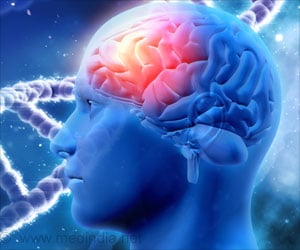- Alzheimer’s disease leads to cognitive decline and memory loss due to the aggregation of toxic proteins in the brain
- A research team from Cambridge has now developed computer-based antibodies to prevent the toxic proteins from forming clumps
- The antibodies are highly specific and are cheaper than traditional antibodies
The toxic deposits, amyloid beta, that accumulates in patients with Alzheimer’s disease is systematically scanned by the antibodies. These newly developed antibodies target regions on the amyloid beta sequences that prevent these toxic substances from forming aggregates.
Alzheimer’s disease is one of the most common forms of dementia among the elderly and is characterized by problems associated with memory, behavior and thinking. This neurodegenerative disorder is found to affect more than one million people in the UK and nearly 50 million across the world. In India, the number of people with Alzheimer’s disease continues to increase due to its vast population.
The characteristic toxic build-up of plaques affects the brain of the patients with symptoms that include loss of memory, poor language skills, irritability and outbursts of anger. The protein deposits that occur in the brain are naturally occurring proteins that are folded wrongly, leading to aggregation that damages the brain. The two proteins are:
- amyloid-beta
- tau (τ proteins)
Antibodies have for so long been used to target antigens which are harmful pathogens. The current study utilizes this mechanism of the antibodies to find a method of preventing the toxic protein aggregation in Alzheimer’s disease. Though there are a few antibody-based treatment methods that are currently being trialed in clinical trials for Alzheimer’s disease, there are no antibodies that have been specially developed to treat Alzheimer’s till now.
Methods of Producing Antibodies
- Injecting animals: This method of developing antibodies have been in use for longer than 50 years, and it involves the injection of animals with the antigen. This antigen then elicits an immune response from the host, which results in the development of antibodies. These antibodies are extracted and used for therapy.
- Laboratory-based Antibodies: In the laboratory-based method, there are large libraries that are constructed to isolate relevant antibodies.
- Being able to target specific regions on the antigen
- Being stable
- Being soluble
- Being smaller in size
Since the antibodies are designed using a computer, they are systematically altered to bind to the various regions of the antigen. This would help the scientists define the best method of preventing the aggregation of toxins in Alzheimer’s disease.
Treatment of Alzheimer’s Disease with Drug Therapy
Alzheimer’s disease has been treated with drug therapy that is largely symptom based. The drugs are used to lower the intensity of cognitive decline. The amyloid beta aggregates are known to begin about 20 years before the onset of the disease, therefore, for effective treatment, and to prevent the disease, treatment should begin before the onset of symptoms.
There are two monoclonal antibodies that are currently under clinical trials for use as treatment for Alzheimer’s disease
- Solanezumab these antibodies have shown to be effective against cognitive decline that is found to affect Alzheimer’s disease patients
- Gantenerumab and Crenezumab – These antibody-based treatment methods are aimed at controlling the course of the disease.
References:
- What Is Alzheimer’s? - (http://www.alz.org/alzheimers_disease_what_is_alzheimers.asp)
- Alzheimers in India - (http://www.alzheimerindia.org/alzheimers-in-india/)
- Novel strategies for Alzheimer’s disease treatment: An overview of anti-amyloid beta monoclonal antibodies - (https://www.ncbi.nlm.nih.gov/pmc/articles/PMC5155461/)











